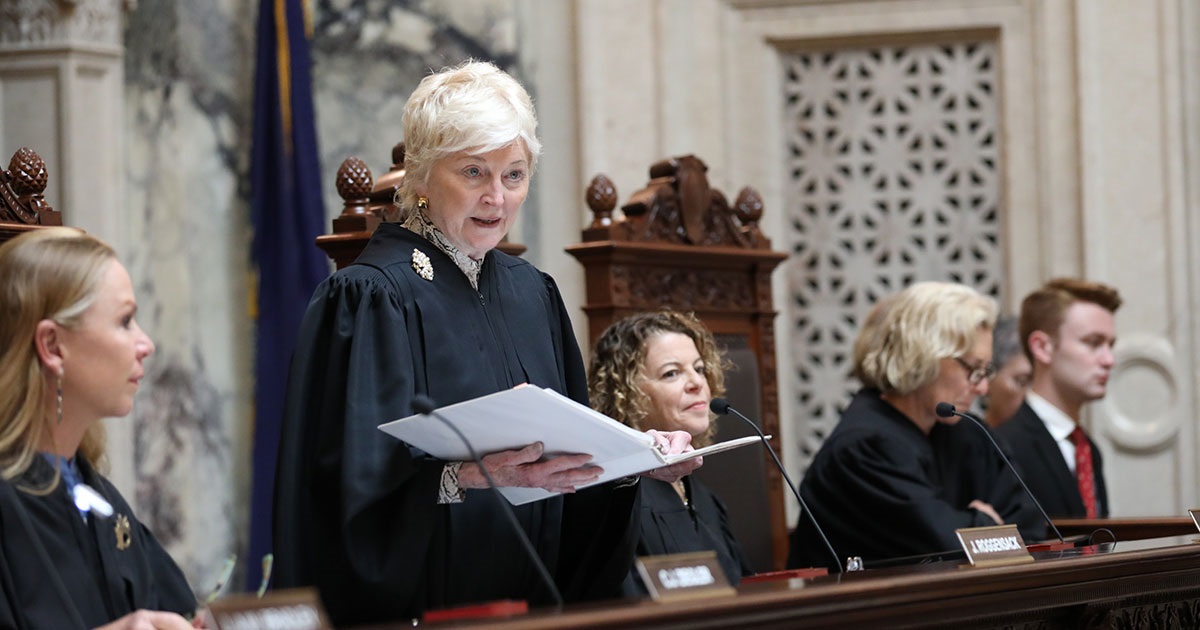
Justice Patience Drake Roggensack administers the oath of office to a group of new lawyers during a ceremony in the Supreme Court Hearing Room in April 2023. (Photo by Shannon Green, State Bar of Wisconsin)
After 27 years of judicial service to the state of Wisconsin, including seven years on the Court of Appeals and 20 years on the Supreme Court, Justice Patience Drake Roggensack will retire July 31.
Third Branch eNews asked Justice Roggensack to offer perspective on her career and accomplishments in a Q&A article (below).
Roggensack was the state’s first Court of Appeals judge to win election to the Wisconsin Supreme Court (2003). She was also the first justice to be elected chief justice by the members of the Supreme Court (2015) after a constitutional amendment shifted that determination from a seniority system to a vote of the Supreme Court. She was re-elected chief justice in 2017 and 2019.
Chief Justice Annette Kingsland Ziegler credits Roggensack’s leadership, along with the Supreme Court’s approval of interim rules and procedures, with keeping the court system operating through the COVID-19 pandemic. Roggensack is also credited with launching the commercial court docket pilot program, establishing the Supreme Court finance committee and undertaking successful efforts to increase judicial compensation during her tenure as chief justice.
Roggensack’s judicial career started in1996 when she was elected to the Court of Appeals. She served on the District IV bench until her election to the Supreme Court in 2003. She was re-elected to serve a second 10-year term on the Supreme Court in 2013.
Prior to becoming a judge, Roggensack worked in private practice for 16 years, handling a wide range of case types in state and federal courts. She graduated with honors from UW Law School in 1980.
Additional biographical information can be found on the court system’s website. Wisconsin Lawyer magazine published an in-depth profile on Justice Roggensack on June 8.
Justice Roggensack is a past commissioner of the Uniform Laws Commission and a Fellow of the American Bar Foundation. She has served as chairperson of the Wisconsin Judicial Conference, chairperson of the Commission on Children and Families, chairperson of PPAC (Planning and Policy Advisory Committee), chairperson of the Supreme Court Finance Committee and a member of the Committee for Public Trust and Confidence in the Courts. She is a member of the American Bar Association, the State Bar of Wisconsin, and the Western District of Wisconsin Bar Association, of which she is a past president.
She is a member of the International Women's Forum and a past president of the Wisconsin chapter. She is a frequent guest lecturer at the University of Wisconsin Law School, Marquette University Law School and many state and national organizations.
Q: You decided on attending law school after earning a degree in biology from Drake University in 1962, working as a research associate at several universities, getting married and starting a family with your husband George. What led your shift to law school at that point?
A: Subsequent to graduating from Drake, I became interested in learning more about law. In 1976-77, I took two semesters of constitutional law, taught by Professor David Adamany (at the University of Wisconsin in Madison). He loved the law and communicated that during the courses I took from him. He was my inspiration to attend law school.
Q: Do you think there was any advantage to that approach, rather than going directly into law school after earning an undergraduate degree?
A: The timing worked for me and my growing family.
Q: Did your science background help inform your decision-making as chief justice during the pandemic?
A: Science requires an attention to detail and a thoughtful method for proceeding. Attention to details and thoughtful organization is necessary to being effective as chief justice.
Q: What career accomplishment or accomplishments stand out as most satisfying?
A: I have been privileged to employ wonderful law clerks. They are very intelligent and were lots of fun to work with on a vast assortment of projects.
Q: When you became a justice, did you ever think women would hold six of seven seats on the Supreme Court?
A: I never thought about it at all.
Q: What’s next for you? Will you continue work in the legal field in some fashion? Travel more? Spend more time with family? Pursue an interests that may have been set aside?
A: I am very interested in trying to assist Milwaukee in replacing the "safety building," where Milwaukee County criminal courts meet and the sheriff and district attorney have their offices.
Third Branch eNews is an online monthly newsletter of the Director of State Courts Office. If you are interested in contributing an article about your department’s programs or accomplishments, contact your department head. Information about judicial retirements and judicial obituaries may be submitted to: Sara.Foster@wicourts.gov

